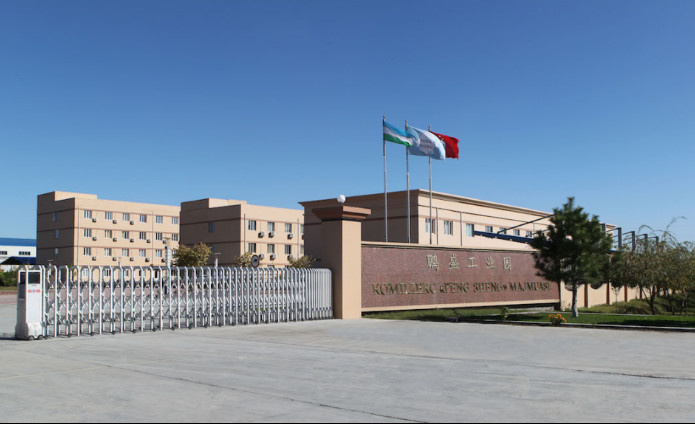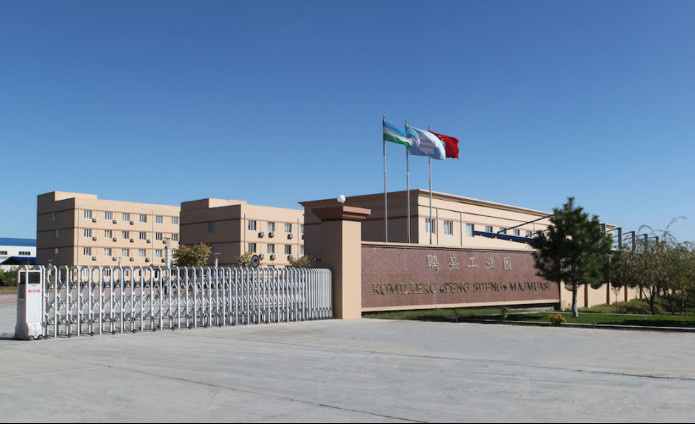By He Yin, People's Daily

Photo shows the Pengsheng Industrial Park in Uzbekistan. (Photo from cocz.org)
In September 2013, Chinese President Xi Jinping for the first time proposed building the Silk Road Economic Belt in a speech he delivered in Kazakhstan. Thus, Central Asia is where the Belt and Road Initiative (BRI) was initiated.
Over the past decade, China and Central Asian countries have proactively promoted the synergy of their development strategies and achieved fruitful results in high-quality Belt and Road cooperation.
The China-Central Asia Summit to be held in Xi'an, northwest China's Shaanxi province will further build consensus between China and Central Asian countries and consolidate their positions as pioneers in advancing high-quality Belt and Road cooperation.
Central Asia is a demonstration zone of high-quality Belt and Road cooperation. The BRI is actively seeking alignment with the Central Asian countries' development strategies, carrying out a series of win-win projects that bring tangible benefits to the people in the region, including the China-Kazakhstan crude oil pipeline, the China-Central Asia gas pipeline, the China-Kyrgyzstan-Uzbekistan highway, the Pengsheng Industrial Park and the China-Tajikistan-Uzbekistan highway.
The China-Kazakhstan Horgos International Frontier Cooperation Center and the China-Kazakhstan International Logistics Base in the eastern Chinese port of Lianyungang have provided Central Asian countries with a gate to the global market.
The Qamchiq Tunnel built by a Chinese enterprise along the Angren–Pap railway line, which is the longest tunnel in Central Asia, has put an end to the days when local travelers had to cross mountains or take diversion routes via neighboring nations in order to reach their destinations.
Industrial parks supported by China have sprung up in Central Asia, which not only create massive jobs and train a tremendous number of local professionals, but also drive local industrial development and upgrade.
These examples of Belt and Road cooperation between China and Central Asian countries vividly explain the Central Asian proverbs that "An empty sack cannot stand upright" and "A tree gets attention only when it bears fruits."
The development of relations between China and Central Asian countries provides important political guarantees for Belt and Road cooperation.
Over the past decade, Xi has paid multiple visits to Central Asian countries and maintained frequent contact by multiple means with leaders of these countries, promoting the leapfrog development of relations between China and Central Asian countries.
At the virtual summit commemorating the 30th anniversary of diplomatic relations between China and Central Asian countries held in January 2022, the two sides announced to build an even closer China-Central Asia community with a shared future and usher in a new era of their relations.
Today, China has elevated its ties with Kazakhstan to a permanent comprehensive strategic partnership and established comprehensive strategic partnerships with Uzbekistan, Kyrgyzstan, Tajikistan and Turkmenistan. It has signed Belt and Road cooperation documents with all five Central Asian countries.
Besides, stronger synergy is being built between China's BRI and Kazakhstan's Bright Path new economic policy, Tajikistan's national development strategy by 2030, Kyrgyzstan's 2040 National Sustainable Development Strategy, the New Uzbekistan Development Strategy for 2022-2026 and Turkmenistan's development strategy to revive the Great Silk Road.
People-to-people bond lays a public and societal foundation for Belt and Road construction.
Over the past decade, China and Central Asian countries have constantly strengthened friendly exchanges and enhanced mutual understanding and their traditional friendship.
The two sides have established 62 pairs of sister provinces and cities, seeing hundreds of thousands of mutual visits each year. The Confucius Institutes and Classrooms in Central Asian countries have triggered a craze for learning the Chinese language and Chinese culture.
The first Luban Workshop in Central Asia, a China-initiated international program of vocational training, was put into use in Dushanbe, capital of Tajikistan.
A center of traditional medicine between China and Kazakhstan, the China-Central Asia Agricultural Cooperation Center and a China-Central Asia agricultural science and technology demonstration park have been inaugurated. The two sides also launched a joint educational training program and a joint poverty reduction program for farmers.
These cooperation projects and programs all indicate the solid public foundation for the thousand-year friendship between China and Central Asian countries, and for the joint construction of the BRI.
The China-Central Asia Summit is expected to inject a strong impetus into the high-quality BRI cooperation between China and Central Asian countries. At present, Central Asian countries are having an increasingly stronger desire to advance high-quality cooperation with China.
Kazakh President Kassym-Jomart Tokayev said that Belt and Road construction has grown into a crucial engine in building a community with a shared future for mankind, and Kazakhstan will continue to actively support and participate in the Belt and Road cooperation.
Tajikistan said it is willing to join Belt and Road cooperation and expand its cooperation with China in economy and trade, industry, energy and infrastructure under the BRI framework, said Tajik President Emomali Rahmon.
Turkmen President Serdar Berdimuhamedov also expressed the willingness to promote synergy between Turkmenistan's development strategy to revive the Great Silk Road and the BRI, and to further expand its economic and trade cooperation with China.
China and Central Asian countries have kept improving the facilitation of trade and investment and expanding mutual investment and trade. Meanwhile, the two sides will continue deepening cooperation in production capacity, energy, agriculture, digital economy and other fields, ensure the smooth progress of key cooperation projects, foster new growth points for bilateral cooperation and create more benefits for the people.
In Xi'an, the starting point of the ancient Silk Road and the host city of the upcoming summit, China and Central Asian countries will take the opportunity to promote high-quality Belt and Road cooperation, and make new and greater contributions to building an even closer China-Central Asia community with a shared future.
Over the past decade, China and Central Asian countries have proactively promoted the synergy of their development strategies and achieved fruitful results in high-quality Belt and Road cooperation.
The China-Central Asia Summit to be held in Xi'an, northwest China's Shaanxi province will further build consensus between China and Central Asian countries and consolidate their positions as pioneers in advancing high-quality Belt and Road cooperation.
Central Asia is a demonstration zone of high-quality Belt and Road cooperation. The BRI is actively seeking alignment with the Central Asian countries' development strategies, carrying out a series of win-win projects that bring tangible benefits to the people in the region, including the China-Kazakhstan crude oil pipeline, the China-Central Asia gas pipeline, the China-Kyrgyzstan-Uzbekistan highway, the Pengsheng Industrial Park and the China-Tajikistan-Uzbekistan highway.
The China-Kazakhstan Horgos International Frontier Cooperation Center and the China-Kazakhstan International Logistics Base in the eastern Chinese port of Lianyungang have provided Central Asian countries with a gate to the global market.
The Qamchiq Tunnel built by a Chinese enterprise along the Angren–Pap railway line, which is the longest tunnel in Central Asia, has put an end to the days when local travelers had to cross mountains or take diversion routes via neighboring nations in order to reach their destinations.
Industrial parks supported by China have sprung up in Central Asia, which not only create massive jobs and train a tremendous number of local professionals, but also drive local industrial development and upgrade.
These examples of Belt and Road cooperation between China and Central Asian countries vividly explain the Central Asian proverbs that "An empty sack cannot stand upright" and "A tree gets attention only when it bears fruits."
The development of relations between China and Central Asian countries provides important political guarantees for Belt and Road cooperation.
Over the past decade, Xi has paid multiple visits to Central Asian countries and maintained frequent contact by multiple means with leaders of these countries, promoting the leapfrog development of relations between China and Central Asian countries.
At the virtual summit commemorating the 30th anniversary of diplomatic relations between China and Central Asian countries held in January 2022, the two sides announced to build an even closer China-Central Asia community with a shared future and usher in a new era of their relations.
Today, China has elevated its ties with Kazakhstan to a permanent comprehensive strategic partnership and established comprehensive strategic partnerships with Uzbekistan, Kyrgyzstan, Tajikistan and Turkmenistan. It has signed Belt and Road cooperation documents with all five Central Asian countries.
Besides, stronger synergy is being built between China's BRI and Kazakhstan's Bright Path new economic policy, Tajikistan's national development strategy by 2030, Kyrgyzstan's 2040 National Sustainable Development Strategy, the New Uzbekistan Development Strategy for 2022-2026 and Turkmenistan's development strategy to revive the Great Silk Road.
People-to-people bond lays a public and societal foundation for Belt and Road construction.
Over the past decade, China and Central Asian countries have constantly strengthened friendly exchanges and enhanced mutual understanding and their traditional friendship.
The two sides have established 62 pairs of sister provinces and cities, seeing hundreds of thousands of mutual visits each year. The Confucius Institutes and Classrooms in Central Asian countries have triggered a craze for learning the Chinese language and Chinese culture.
The first Luban Workshop in Central Asia, a China-initiated international program of vocational training, was put into use in Dushanbe, capital of Tajikistan.
A center of traditional medicine between China and Kazakhstan, the China-Central Asia Agricultural Cooperation Center and a China-Central Asia agricultural science and technology demonstration park have been inaugurated. The two sides also launched a joint educational training program and a joint poverty reduction program for farmers.
These cooperation projects and programs all indicate the solid public foundation for the thousand-year friendship between China and Central Asian countries, and for the joint construction of the BRI.
The China-Central Asia Summit is expected to inject a strong impetus into the high-quality BRI cooperation between China and Central Asian countries. At present, Central Asian countries are having an increasingly stronger desire to advance high-quality cooperation with China.
Kazakh President Kassym-Jomart Tokayev said that Belt and Road construction has grown into a crucial engine in building a community with a shared future for mankind, and Kazakhstan will continue to actively support and participate in the Belt and Road cooperation.
Tajikistan said it is willing to join Belt and Road cooperation and expand its cooperation with China in economy and trade, industry, energy and infrastructure under the BRI framework, said Tajik President Emomali Rahmon.
Turkmen President Serdar Berdimuhamedov also expressed the willingness to promote synergy between Turkmenistan's development strategy to revive the Great Silk Road and the BRI, and to further expand its economic and trade cooperation with China.
China and Central Asian countries have kept improving the facilitation of trade and investment and expanding mutual investment and trade. Meanwhile, the two sides will continue deepening cooperation in production capacity, energy, agriculture, digital economy and other fields, ensure the smooth progress of key cooperation projects, foster new growth points for bilateral cooperation and create more benefits for the people.
In Xi'an, the starting point of the ancient Silk Road and the host city of the upcoming summit, China and Central Asian countries will take the opportunity to promote high-quality Belt and Road cooperation, and make new and greater contributions to building an even closer China-Central Asia community with a shared future.
 Menu
Menu
 China, Central Asian countries to remain pioneers in Belt and Road cooperation
China, Central Asian countries to remain pioneers in Belt and Road cooperation
















